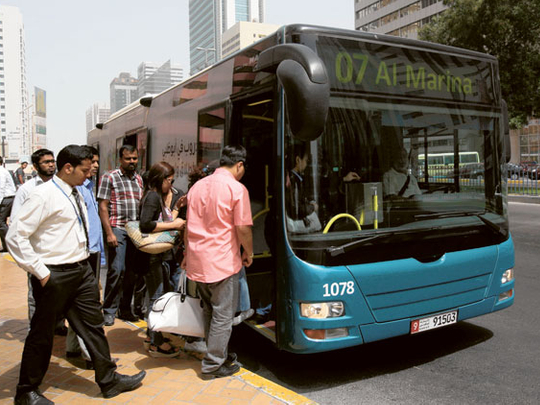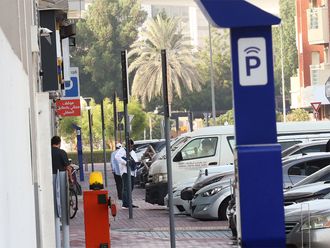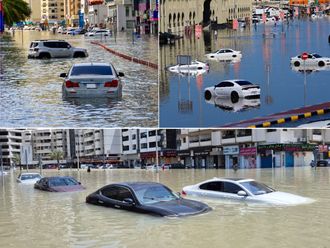
Abu Dhabi: The fares for public bus services across Abu Dhabi will be increased by up to 100 per cent as of November 1 to stop misuse of the network, a senior official told Gulf News on Wednesday.
Fares were previously just Dh1 and officials spoke of how often passengers don’t bother to pay the fare.
By increasing the fare from Dh1 to Dh2, and adding a fully automated collection service, officials hope to make sure bus journeys are paid for.
The automated service is planned to be similar to the Nol card system on Dubai’s Metro where a card is scanned showing when passengers enter and leave stations and the distance they travel.
The new fare structure unifies public transport tariffs throughout the emirate, making it Dh2 within Abu Dhabi city, while in the suburbs the tariff will start from Dh2 in addition to 5 fils per km, with Dh5 being the average, said Saeed Mohammed Fadel Al Hameli, General Manager of the Bus Office at the Department of Transport.
He added that the tariff for inter-city public transport will start from Dh10 in addition to 10 fils per km with Dh25 being the average.
Al Hameli said the new structure was adopted after months of in-depth studies into all economic aspects relating to the use of the public transport system to provide a more efficient and reliable public transportation service.
Al Hameli added: “We are continuously striving to upgrade and enhance the public transportation network in order to provide commuters with a comfortable and safe transport system whereby the means of transportation becomes the ideal choice for commuters — this will ultimately reduce traffic congestion and protect the environment.”
Al Hameli also announced that a fully automated fare collection system will be introduced by the end of next year to efficiently monitor the use of the network and payment of the right tariffs.
The current bus fleet includes around 800 modern buses accommodating more than 170,000 commuters per day.
In addition, more than 500 buses operate in Abu Dhabi city, over 200 in Al Ain and 80 buses have been allocated for inter-city travel, all of which operate at an average of 18 hours per day.
Al Hameli said plans are in place to increase the fleet to 1,360 buses within the next three years.
Furthermore, several new bus routes have been introduced recently across the emirate, such as Mussafah bus station-Al Ain International Airport, Abu Dhabi International terminal–Al Ain bus station and Abu Dhabi bus station–Al Ain bus station.
Additional routes will also be introduced in the next few months as part of the DoT’s efforts to boost the usability of public transport.
Meanwhile the Department of Transport has also launched Ojra bus cards in Al Ain and the Western Region — the cards are currently available in the capital.
In addition, “Reaya” cards are on offer for senior citizens, aged 60, and individuals with special needs, in Abu Dhabi emirate.
“Hafelaty” cards are available for students in Abu Dhabi emirate as a part of efforts to develop and enhance the public transport system in Abu Dhabi, said Al Hameli.
Passengers may purchase “Ojra” bus passes for unlimited weekly or monthly use for a nominal charge of Dh30 per week or Dh80 per month. Annual Ojra cards, entitled “Hafelaty”, are available for students for Dh500, while senior citizens over the age of 60 and individuals with special needs will be eligible for a new “Reaya” card that entitles them to free unlimited travel on all of the DoT buses.
Ojra cards are available for purchase at accredited selling points and at all Red Crescent centres across the emirate. It is worth mentioning that terms and conditions apply on all cards.












